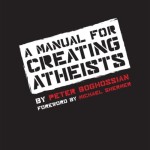Important Features of the Metaphysical Proof for God
by Karlo Broussard
Filed under Atheism, The Existence of God
NOTE: Today we wrap up our six-part series by Karlo Broussard on a metaphysical proof for God's existence. You can reach reach of the prior posts below:
- Part 1 - Why Must There Be at Least One Unconditioned Reality?
- Part 2 - The Absolute Simplicity of Unconditioned Reality
- Part 3 - The Absolute Uniqueness of Unconditioned Reality
- Part 4 - The Key Divine Attributes of the Absolutely Unique and Simple Unconditioned Reality
- Part 5 - Key Attributes: Perfection and the Three Omnis
- Part 6 - Important Features of the Metaphysical Proof
The current post is the final installment of a six part series on a metaphysical demonstration for God’s existence from the notion of ontological conditions. Although I completed the demonstration itself in the fifth installment, I wanted to highlight a few reasons why this sort of metaphysical demonstration is so important with an eye on some common objections from atheists.
First, this sort of approach to God’s existence is important in the modern debate between atheism and theism because for such an approach the temporal duration of the universe – whether it had a beginning or not – is irrelevant.
Upon hearing this metaphysical demonstration many will think that the series of conditioned realities spoken of in the first post is a temporal series that extends back into the past; therefore this approach is often perceived as an argument for the universe having a beginning and the Creator being the cause of that beginning. Such a perception inevitably gives rise to the whole debate about whether or not we can know that the universe had a beginning. But this is not what the argument of this series consists of.
Recall that the series of conditioned realities spoken of in the first installment did not extend back in time (e.g., I needed my father to come into existence, my father needed his father, etc.) but it extended downwards so to speak to the most fundamental levels of physical reality. This is what philosophers call an essentially ordered series (or a hierarchical series) versus an accidentally ordered series (or temporal series).
The accidentally ordered series is exemplified with the series of dependence involving me, my father, his father, and so on. The idea is that although I needed my father to come into existence, I do not need my father to exist in order for me to exist right here and right now. In other words, my father’s existence is accidental and not essential for me to exist right here and right now.
But, in an essentially ordered series, the existing conditions that a conditioned reality (e.g., the cat) is dependent on are essential for its very existence right here and right now. It is essential to the cat’s existence that the cells, the molecules, the atoms, the protons, the quarks, etc. exist right here and right now. This is the sort of series that the demonstration involves.
As such, an eternal universe (a universe without beginning and without end) would still need God as the ground of its eternal existence – eternally fulfilling the conditions necessary for its existence. God would still be needed to answer the question, “Why does the universe exists at all (even if eternal) rather than not?” So, if at some time in the future scientists discover some piece of data that begins to alter the common view of an absolute beginning of time and physical reality, there is no need for the theist to fret for he or she remains standing on solid ground with this sort of metaphysical demonstration.
The second reason why this demonstration is important is because it adequately responds to the misconception that our assertion that God is unconditioned is an arbitrary exception. Recall how we began in the first installment trying to account for the existence of the cat and such an endeavor led us to a series of conditioned realities that needed other conditioned realties to exist. We then arrived at an unconditioned reality, namely God, that stopped the series. Now, many think this is an arbitrary exception to the series of conditioned realities.
But our conclusion that God is unconditioned reality is not arbitrary at all. The reality that we arrive at in order to explain the existence of the cat here and now is unconditioned by logical necessity. As we demonstrated in the first installment of the demonstration, to postulate that there is no unconditioned reality (Hypothesis ~UR) in trying to explain the cat’s existence is to end up with an intrinsic contradiction – namely the denial of the cat’s existence when the cat in fact exists. Since hypothesis ~UR is false, then hypothesis UR, namely that there is an unconditioned reality grounding the existence of the cat, must be true.
The third point of importance follows from the second. Our claim that the series cannot regress ad infinitum is not one of probability but one of logical necessity. For example, some theists who argue for God’s existence using the Kalam cosmological argument stop the infinite regress of causes in a causal series by appealing to Ockham’s razor. It is argued that we need not posit anymore causes once we arrive at the transcendent cause of the universe because Ockham’s Razor states we should not multiply causes beyond necessity. In other words, we arrived at an explanation for the universe and there is really no need to explain the explanation.
But in the metaphysical demonstration as presented in this series, we’re not saying that the series cannot regress ad infinitum because of Ockham’s Razor but because of the very nature of the sufficient condition that we arrive at as the explanation for the cat existing right here and right now. The nature of this condition is that it is unconditioned; thus the series of conditions cannot regress any further.
The fourth reason for the importance of this approach to God’s existence is basically the same as the third but stated in a different way. We can see how the question, “Who created God?” is an incoherent question. If God by his very nature is unconditioned reality, then the question, “Who created God?” is tantamount to asking, “What is the condition for the unconditioned reality?” This is akin to asking, “Who is the bachelor’s wife?” Obviously this is an incoherent question if one understands that a bachelor has no wife. Similarly, to ask, “Who created God?” or “What is God’s condition?” is seen as incoherent if one understands that God, by definition, has no conditions. Therefore, the question, “Who created God?” is a moot point.
Finally, the fifth reason why this type of metaphysical argument is so important in the modern debate is because it escapes the common objection from the fallacy of composition. The fallacy of composition arises when one infers that something is true of the whole from the fact that it is true of some part of the whole. For example, it is fallacious to reason that because each Lego brick weighs 1.64 grams the whole wall of bricks weighs 1.64 grams.
Some atheists perceive this fallacy in the present argument. They will argue that even though each individual thing within the universe might need conditions fulfilled in order to exist it does not follow that the universe as a whole needs conditions fulfilled in order to exist. Therefore, it’s fallacious to argue that the universe as a whole is a conditioned reality that needs God to fulfill its conditions.
Now, besides the fact that this argument does not hold water because the conditionality of each thing in the universe is not quantitative in nature but qualitative (and thus the universe as a whole would be a conditioned reality needing conditions fulfilled in order to exist), the argument does not work against the metaphysical approach of this series because the demonstration never argues for God from the universe as a whole needing its conditions fulfilled. It starts with one thing in the universe, namely a cat, and then reasons to the one unconditioned reality as the ground of its existence.
It is true that in the end we must conclude that the universe as a whole finds its existence grounded in the one unconditioned reality but it is a consequence of the argument and not a part of it. At least for this argument, belief that the universe as whole finds its existence grounded in the one unconditioned reality presupposes that the one unconditioned reality exist. The reasoning is as follows: 1) Because there is only one unconditioned reality in all of reality, everything else in existence besides the one unconditioned reality (the universe and the whole of the created order) is a conditioned reality; 2) Every conditioned reality has its existence grounded in the one unconditioned reality. 3) Therefore, the universe as a whole (and the whole of created order) has its existence grounded in the one unconditioned reality. Since the universe’s existential dependence on God is a consequence of the argument and not a part it, this type of metaphysical demonstration escapes the fallacy of composition.
So, in conclusion, with the metaphysical demonstration and its importance in the modern dialogue on God’s existence now in place, I believe we can conclude that the acceptance of God’s existence stands on the firm foundation of reason. As the Catechism of the Catholic Church states in paragraph 156, “faith is by no means a blind impulse of the mind.” The acceptance of God’s existence does not require that one leave his or her reason at the door. Furthermore, this type of metaphysical argument for God’s existence (and many others like it) shows how the perception that theism is intellectually shallow and naïve is simply a myth. Atheism by no means has the intellectual high ground. It is theism that does so since it is theism that gives a sufficient answer to the most fundamental question, “Why does something exist at all rather than not?” That answer, as demonstrated in this series of posts, is God.
Related Posts
Note: Our goal is to cultivate serious and respectful dialogue. While it's OK to disagree—even encouraged!—any snarky, offensive, or off-topic comments will be deleted. Before commenting please read the Commenting Rules and Tips. If you're having trouble commenting, read the Commenting Instructions.













